The Relationship Between Participation in Extracurricular Activities and Academic Achievement of FIK Uncen Students Class of 2017
Abstract
The purpose of this study was to determine the correlation of participation in extracurricular activities with the academic achievement of FIK Uncen students class 2017. The reason behind the researcher lifting the title of this research is because students' interest in extracurricular is so low. In essence, where extracurricular activities have a relationship with academic achievement. This research includes correlational research. The sample in this study were FIK Uncen 2017 students, totaling 26 people. There are two data collection instruments used, namely questionnaires used to measure participation in extracurricular activities and documentation (Study Results) to see the academic achievements of FIK Uncen 2017 students. The data collection techniques used were in three stages, namely interviews, distributing questionnaires, and achievement data. academic. There are two stages of data analysis technique, namely expert judgment validity testing and hypothesis testing with product moment correlation with the help of the SPSS version 22.0 program. The results showed that the p value of 0.036 was smaller than the alpha value (α) of 0.05, which means that there is a significant relationship between participation in extracurricular activities and academic achievement of FIK Uncen students class 2017.
References
Abduramanova, D. V. (2020). Significant Features Of Organizing Scientific Extracurricular Activities. Scientific Journal Impact Factor (SJIF), 1(3), 718–722. https://doi.org/ISSN: 2181-1385
Asamoah, M. K. (2014). Re-Examination of the Limitations Associated with Correlational Research. Journal of Educational Research and Reviews, 2(4), 45–52.
Asmani, J. (2011). Buku Panduan Internalisasi Pendidikan Karakter di Sekolah. Diva Pers.
Boonk, L., Gijselaers, H. J. M., Ritzen, H., & Brand-Gruwel, S. (2018). A Review of the Relationship Between Parental Involvement Indicators and Academic Achievement. Educational Research Review, 24, 10–30.
Briggs, W. M., Nguyen, H. T., & Trafimow, D. (2019). The Replacement for Hypothesis Testing. International Conference of the Thailand Econometrics Society, 3–17.
Camerato, K., Clift, A., Golden, M. N., Vivas, J. G., Rogers, P., & Strelecki, A. (2019). What Does “Hight-Impact” Mean In Extracurricular Experiences. The Journal of Campus Activities Practice and Scholarship, 1(1), 60–67.
Duckworth, A. L., Taxer, J. L., Winkler, L. E., Galla, B. M., & Gross, J. J. (2019). Self-Control and Academic Achievement. Annual Review of Psychology, 70, 373–399.
Inriyani, Y., Wahjoedi, & Sudarmiatin. (2017). Peran Kegiatan Ekstrakurikuler untuk Meningkatkan Prestasi Belajar IPS. Prosiding Seminar Nasional Mahasiswa Kerjasama Direktorat Jenderal Guru Dan Tenaga Kependidikan Kemendikbud.
Karim. (2013). Pengaruh Keikutsertaan Siswa dalam Bimbingan Belajar dan Ekstrakurikuler terhadap Prestasi belajar Matematika. JMP Matematika. JPM IAIN Antasari, 1(1), 1–8.
Lei, H., Cui, Y., & Zhou, W. (2018). Relationships Between Student Engagement and Academic Achievement: A Meta-Analysis. Social Behavior and Personality: An International Journal, 46(3), 517–528.
Mendikbud. (2014). Peraturan Menteri Pendidikan dan Kebudayaan Republik Indonesia Nomor 62 Tahun 2014. Kementerian Pendidikan dan Kebudayaan.
Noell, J. F., Díaz, M. P., Feliu, J. C., Peña, R. F., & Burriel, M. P. (2013). Metodologías de Enseñanza y Aprendizaje Reflexivos en la Universidad. Una Investigación Centrada en la Percepción de Estudiantes de Grado de la Universidad de Girona. Revista de Investigación En Educación, 11(2), 60–76.
Noor, J. (2011). Metode Penelitian, Skripsi, Tesis, Disertasi, Dan Karya Ilmiah. Kencana Prenada Media Group.
Putra, M. F. P., & Guntoro, T. S. (2016). Metodologi Penelitian Pendidikan & Olahraga (1 (ed.)). CV. Pustaka Ilalang.
Romero, C., Master, A., Paunesku, D., Dweck, C. S., & Gross, J. J. (2014). Academic and Emotional Functioning in Middle School: The Role of Implicit Theories. Emotion, 14, 227–234. https://doi.org/10.1037/a0035490
Shaffer, M. L. (2019). Impacting Student Motivation: Reasons for Not Eliminating Extracurricular Activities. Journal of Physical Education, Recreation & Dance, 90(7), 8–14.
Suleiman, Y., Hanafi, Z., & Muhajir, T. (2019). Influence of Extracurricular Services on Students’ Academic Achievement in Secondary Schools in Kwara State: A Qualitative Approach. Indonesian Journal on Learning and Advanced Education (IJOLAE), 1(2), 1–19.
Copyright (c) 2021 Jp.jok (Jurnal Pendidikan Jasmani, Olahraga dan Kesehatan)

This work is licensed under a Creative Commons Attribution-ShareAlike 4.0 International License.
Authors retain copyright and grant the journal right of first publication with the work simultaneously licensed under a Creative Commons Attribution 4.0 International License that allows others to share the work with an acknowledgement of the work's authorship and initial publication in this journal.





.png)






